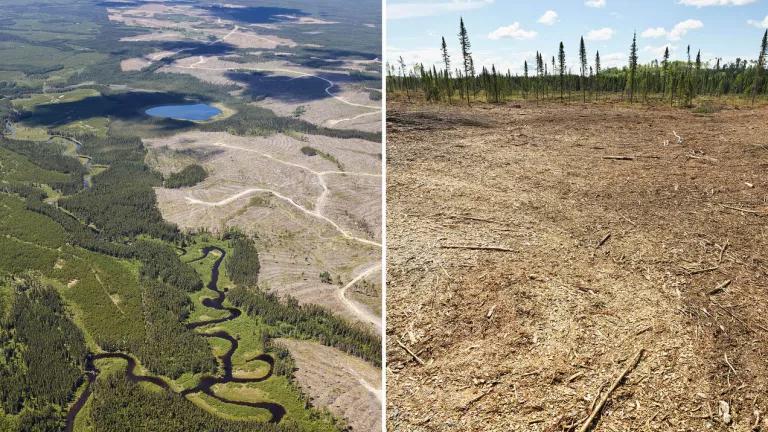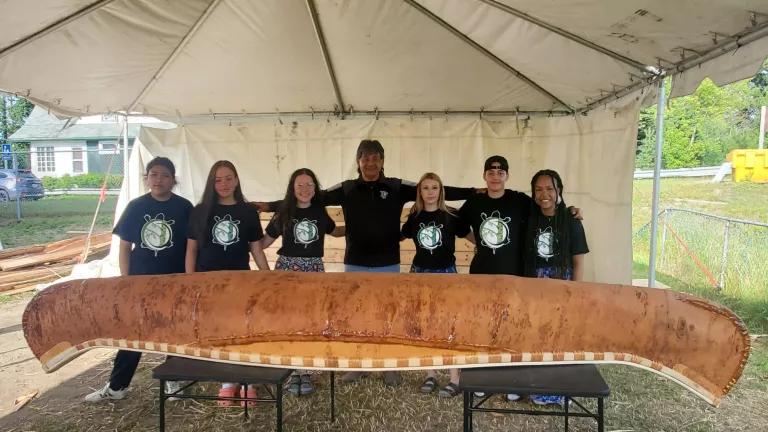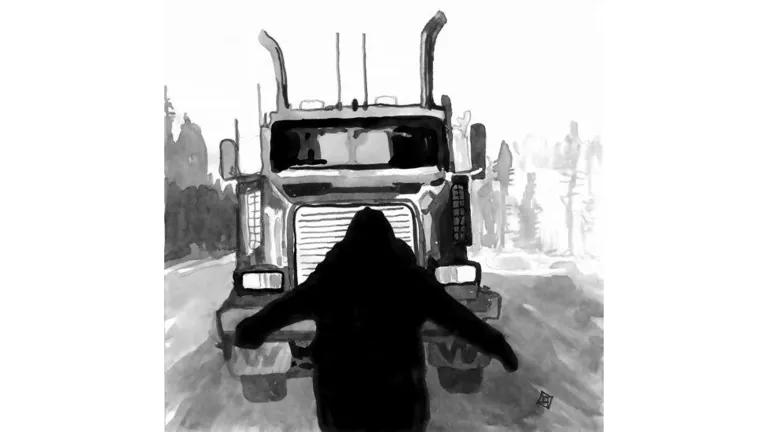Indigenous-led Collaborations Are Transforming Conservation
The emerging Restore, Assert, Defend (RAD) Network convened to develop a shared understanding of how to support decolonized and Indigenous-led conservation.

In April 2023, Indigenous knowledge holders, Elders, spiritual mentors, land guardians and youth, as well as non-Indigenous academics, philanthropists, environmental activists, and policy advisors gathered on the unceded and unsurrendered Territory of the Wolastoqwiyik at Sitansisk to co-create a shared vision for our emergent network and determine how to move forward together to advance Indigenous-led conservation and stewardship. RAD Leadership and Operations Group members stand with Elder Ed Perley and Elder Ramona Nicholas who sings a traditional song dedicated to the Wolastoq river.
Mag Hood (https://maghoodstudios.com/)
The twin global crises of biodiversity loss and climate change are impacting our daily lives. Despite the incremental changes that are underway, governments have failed to implement the policies and practices required to ensure the course correction needed to stave off the worst impacts predicted for our industrialized world. While the pressure is immense and the clock is ticking, we can’t solve our problems using the same thinking that created them.
These complex challenges, while daunting, are unlocking opportunities for transformational change that can lead to a better future for people and the planet. A new collective, called the Restore, Assert, Defend (or RAD) Network, has emerged and is laying the groundwork for such transformational change across Canada, and beyond.

Emerging RAD values.
Ashton Rodenhiser (https://www.mindseyecreative.ca/)
Last month, the RAD Network hosted a visioning gathering entitled Restore, Assert and Defend (RAD) Network: Envisioning the Indigenous-led Conservation Economy. This gathering brought together Indigenous knowledge holders, Elders, spiritual mentors, land guardians and youth, as well as non-Indigenous academics, philanthropists, environmental activists, and policy advisors on the unceded and unsurrendered Territory of the Wolastoqwiyik at Sitansisk (also known as Fredericton, New Brunswick, Canada). The purpose of the gathering was to co-create a shared vision for our emergent network and determine how to move forward together to advance Indigenous-led conservation and stewardship, rooted in reciprocity and supported in part by new and emerging financial pathways. It was grounded in Spirit and ceremony… and love.
“In the Ojibwe culture we have our seven grandfather teachings: bravery, honesty, respect, wisdom and one of the words that is love. I think this is where corporate boardrooms and governments have a hard time with is the word love. Yet love is one of the teachings….How do you write that into contemporary thinking?”
David Flood, RAD Indigenous Leadership Group, Matachewan First Nation, Wahkowtowin Development
You can listen to David Flood's RAD Network podcast here.
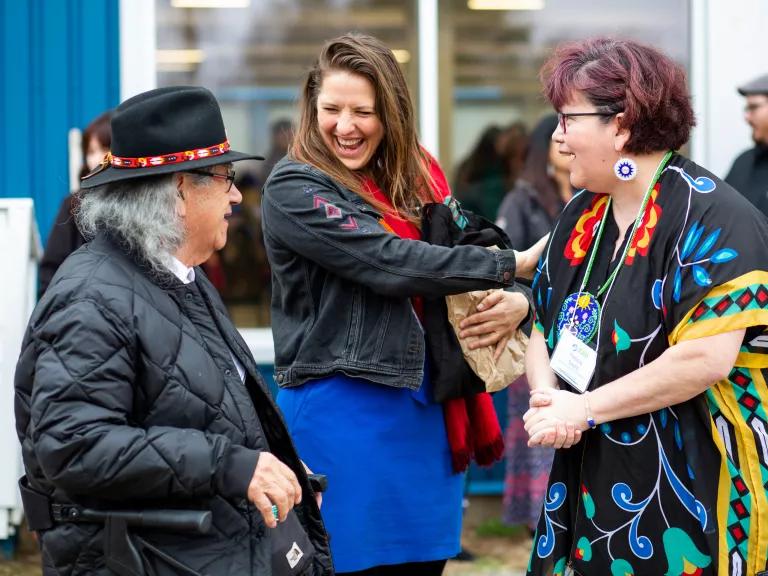
The RAD Network Visioning Gathering was grounded in Spirit, ceremony and love. Left to right: Elder Albert Marshall, Erin Dixon (gathering facilitator) and Patricia Saulis (Local Convenor).
Mag Hood (https://maghoodstudios.com/)
Members of the RAD Network agree that conservation and the resurgence of Indigenous self-determination should go hand-in-hand. For Indigenous-led conservation to be successful, it requires an economic core that can sustain it, in the form of a conservation economy which can bring many aligned benefits such as cultural resurgence, self-determination, Indigenous Guardians, Indigenous-led land protection, and sustainable, economic prosperity.
RAD’s emerging goals:
- Advance Indigenous leadership in conservation through Indigenous Protected and Conserved Areas (IPCAs), Indigenous-led nature-based solutions, land back and self-determination,
- Connect Indigenous peoples, nations and organizations to financial resources which support their ability to care for lands and waters,
- Create practical and scalable tools, resources, templates, and examples of conservation finance options,
- Grow the capacity of communities and make the space of conservation financing less intimidating and more accessible,
- Influence emerging carbon markets and nature-based solutions pathways in Canada, and globally, to benefit Indigenous peoples and center Indigenous rights and responsibilities, knowledge systems and laws.
The RAD Network is pursuing these goals by building relationships and connections, developing practical tools and resources, and sharing knowledge. The approach is firmly grounded in Ethical Space and Two-eyed Seeing, and pursued in alignment with the path that has been walked by the Indigenous Circle of Experts (ICE) and the Conservation Through Reconciliation Partnership.
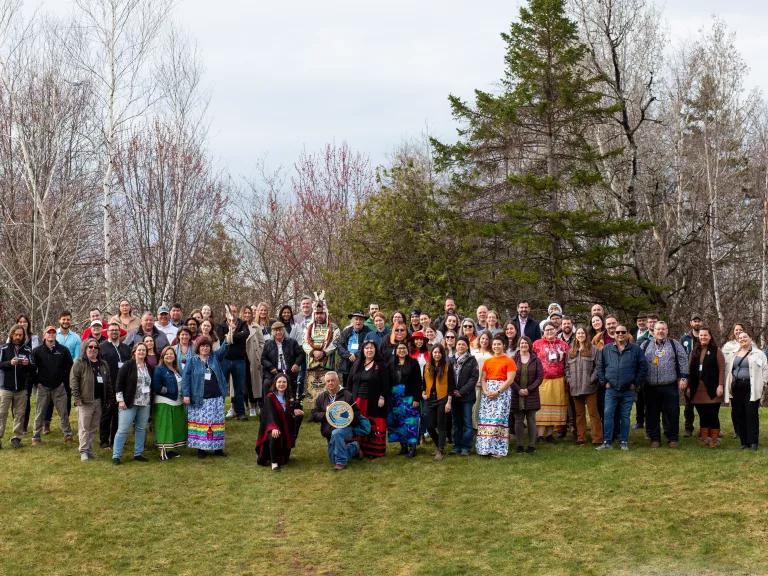
Group photo at the RAD Visioning Gathering held on the Territory of the Wolastoqwiyik.
Mag Hood (https://maghoodstudios.com/)
Collectively, we have a commitment to work together to create Economies of Abundance — protecting and utilizing resources in such a way that all people and other species on this planet are able to thrive, now and in the future, in the spirit of cooperation, mutual aid and the common good.
This gathering, and others like it, have significant implications for the achievement of international commitments. At the December 2022 COP 15 in Montreal, almost 200 governments from around the world signed the Global Biodiversity Framework. The framework commits signatories to protect 30 per cent of the planet by 2030 (known as 30 x 30), increase financing for nature restoration and protection, and halt human-induced extinction - among other priorities.
Specifically, the commitments by national governments to increase protection of lands and waters has been met with apprehension. If these initiatives aren’t undertaken in ways that advance Indigenous rights, they could be used by national governments to continue to perpetuate Indigenous rights violations, including the severance of Indigenous peoples from their ancestral lands. In addition, concerns have been raised that the very definition of conservation is at risk, where governments and industrial interests seem to be focused more on re-branding their activities rather than changing them. This risk is exacerbated when governments put quantitative targets before the quality of ecological safeguards. How these goals are achieved is as important as what is achieved.
“Instead of old approaches, where a national government engineers and delivers a program “on behalf of” Indigenous peoples, Indigenous-led conservation is built from the ground up, with Indigenous nations in the lead, including those long responsible for the land and accountable to youth, elders and future generations. Through this new model of ethical, equitable conservation and by building lasting partnerships with Indigenous peoples, the U.S. and Canada can leverage the knowledge and understanding of local people to fight the existential threats facing climate and nature.”
Steven Nitah, RAD Indigenous Leadership Group, Lutsël K'é Dene First Nation
You can listen to Steven Nitah's RAD Network podcast here.
Transforming conservation requires relationships built on generosity, collaboration, reciprocity, and possibility. It requires centering Indigenous rights and responsibilities, Indigenous governance and Indigenous knowledge systems. It requires non-Indigenous groups to step back and, when invited to do so, play a supporting role.
Indigenous peoples are some of the most directly affected by these twin crises yet contributed far less to creating them. Indigenous conservation approaches can bring elements of responsibility, reciprocity and respect that have sidelined from these national processes. As Canada endeavors to develop its Canadian Biodiversity Strategy, which will lay the pathway for achieving its Global Biodiversity Framework commitments, it should look to groups like the RAD Network for guidance.
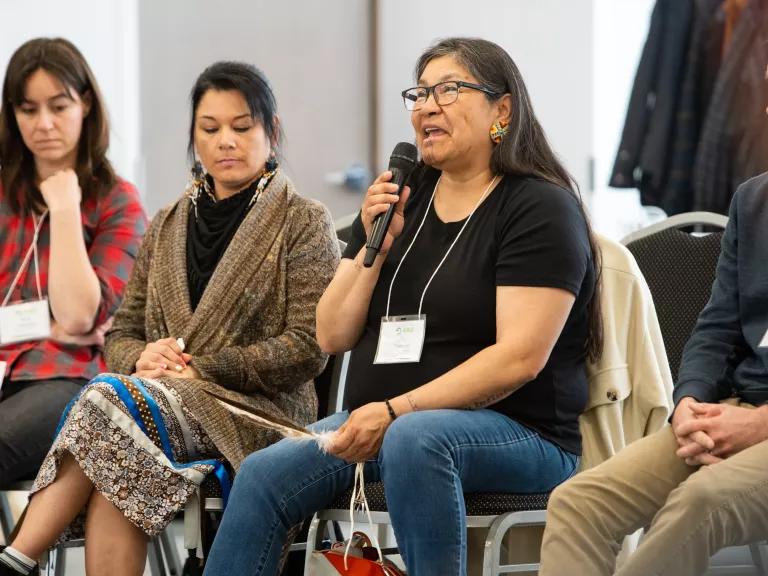
Participants at the RAD Visioning Gathering share their reflections.
Mag Hood (https://maghoodstudios.com/)
To learn more:
The RAD Network hosts a monthly Full Moon Gathering and publishes a monthly newsletter. You can find out how to participate and/or receive more information here: https://conservation-reconciliation.ca/rad
